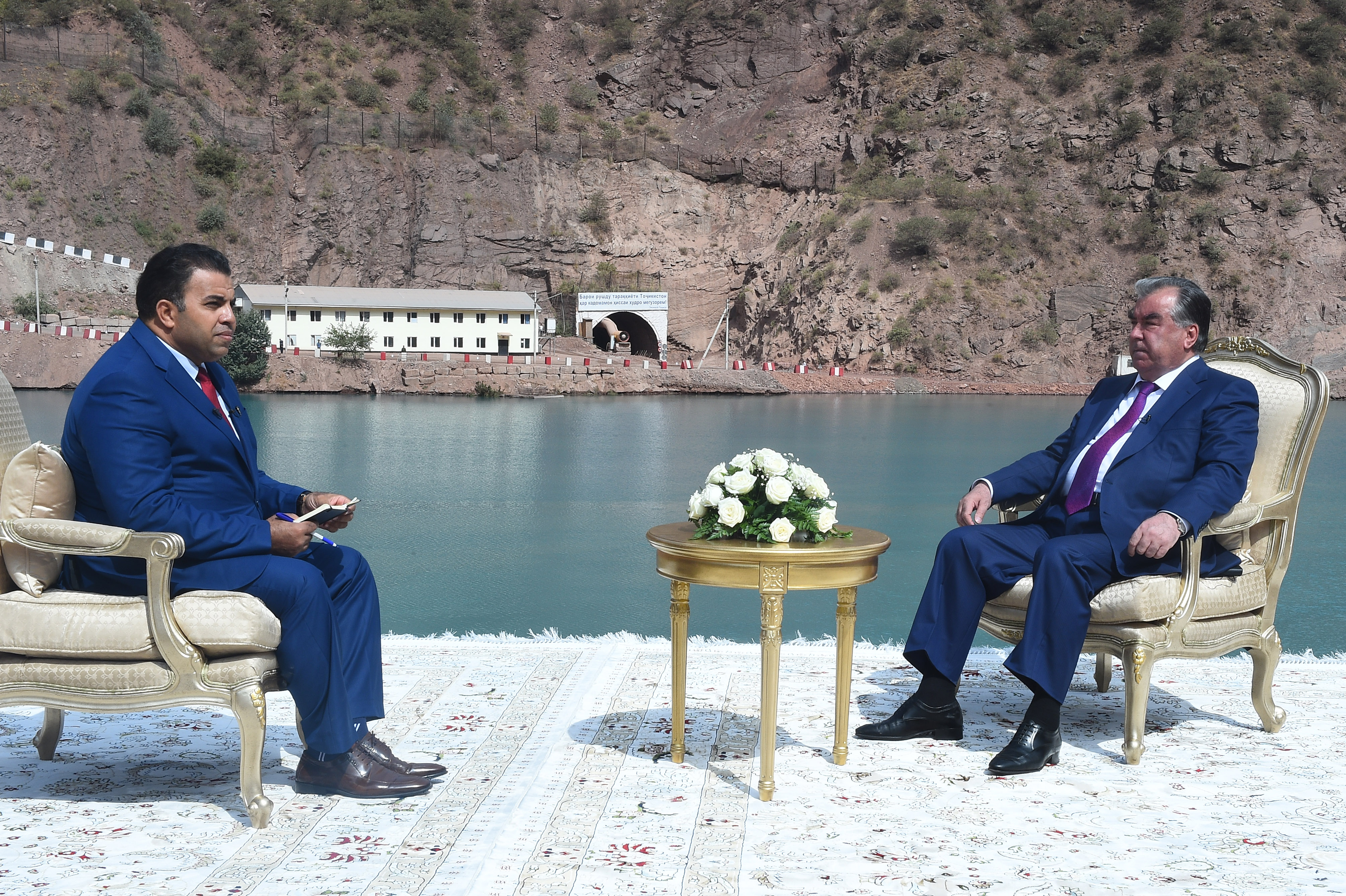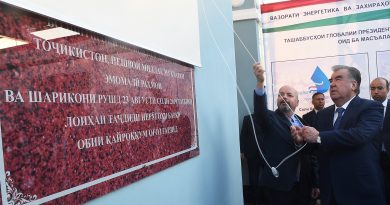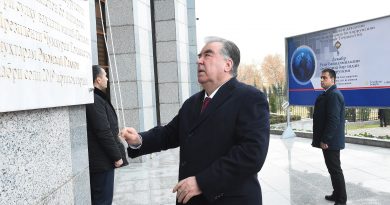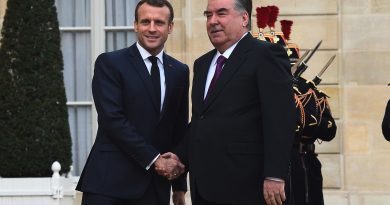Interview to Al Jazeera Television Channel at Rogun HPP
04.10.2019 15:20, Dushanbe city
 The Founder of Peace and National Unity, Leader of the Nation, President of the Republic of Tajikistan Emomali Rahmon gave an interview to Al Jazeera Television Channel. The interview was recorded on September 9 after the commissioning of the second hydro unit of the Roghun Hydropower Plant. President Emomali Rahmon went over Tajikistan’s energy potential, the significance of the huge hydropower facilities of Rogun, the impact and consequences of climate change, Tajikistan’s Global Water Initiatives and its active role in addressing this issue, the UN’s resolution in declaring the International Decade for Action “Water for Sustainable Development, 2018-2028,” as well as current state and prospects of Tajikistan’s regional cooperation.
The Founder of Peace and National Unity, Leader of the Nation, President of the Republic of Tajikistan Emomali Rahmon gave an interview to Al Jazeera Television Channel. The interview was recorded on September 9 after the commissioning of the second hydro unit of the Roghun Hydropower Plant. President Emomali Rahmon went over Tajikistan’s energy potential, the significance of the huge hydropower facilities of Rogun, the impact and consequences of climate change, Tajikistan’s Global Water Initiatives and its active role in addressing this issue, the UN’s resolution in declaring the International Decade for Action “Water for Sustainable Development, 2018-2028,” as well as current state and prospects of Tajikistan’s regional cooperation.
It is noteworthy that all of President Emomali Rahmon’s global initiatives focusing on global challenges, efficient and rational use of hydropower resources, as well as the commissioning of the Rogun hydropower plant have been in the spotlight for the international community.
President: Thank you. I welcome you to Tajikistan. Our independent country does not have sufficient oil and gas sources. Tajikistan’s only wealth is hydropower and according to this indicator we rank eighth in the world. Tajikistan’s resources and potential count over 580 billion kWh. With gaining independence on 9 September 1991, the major challenge we faced was the electricity supply to people and economy. In the first years, we had almost no access to electricity. Tajikistan’s economy also faced serious difficulties. Taking this, we have made a commitment to develop energy sector in Tajikistan. The project study of the Rogun Hydro Power Plant (HPP), where we are now, began long ago during the Soviet period. However later it was forgotten. With the independence, we returned to studying and development of the project, as well as construction works. Today, we are witnessing launching of this HPP’s second unit. What is Rogun? What is hydropower?
Tajikistan ranks eighth in the world in hydropower resources and renewable energy. Today our country ranks sixth in the world in production and consumption of ecologically clean energy.
Climate and nature change is today’s global problem. According to international experts and relevant UN agencies, this year’s July was the hottest month over the recent decades. We are annually witnessing different negative climate change related incidents and casualties. That’s why we have started construction of hydroelectric power plants and generation of “green” energy from renewable sources. We turned to “green” economy. This is important not only for ourselves but also for the region as a whole. The HPP’s we are building can serve all, both neighboring and far regions.
For instance, we are implementing a project called CASA-1000, which is related to HPP’s and aims to build a high-voltage power lines from Tajikistan and Kyrgyzstan to the Islamic Republic of Afghanistan and the Islamic Republic of Pakistan, as well as other Asian countries. Project is supported by the World Bank and costs one billion and hundred million USDs. If nowadays we transmit electricity to some countries, so starting from 2021 we will export large amounts of clean energy to Afghanistan and Pakistan. From this point of view Tajikistan’s hydroelectric power plants play great role in improving the ecological situation in the region. On the other hand, the reservoirs of these HPP’s will provide the population during low water and drought years with the necessary fresh water, as well as assist the countries of the region with the irrigation water. Thus, the development of hydropower is beneficial both for us and for the countries of the region, and for the ecology and development of economy and industry. That is why we are implementing such projects.
Correspondent: Mr. President, you have published a book titled “Tajiks in the Mirror of History”… What is the role of Arabs and Arab investors in Tajikistan’s revival?
President: The role is unsatisfactorily. We consider the Arab countries as one of our key partners in the international arena. We pay constant attention to the development and strengthening of good relations with them. The Arab world should pay enough attention to our region. Past period was a knowledge development period in our relationship. However, to our view, this period took too long. 28 years have passed. Our cooperation with the Arab countries is developing and it is not satisfactorily. We put many efforts to expand our economic, trade and humanitarian cooperation. The Tajik people and the Arab world have a lot in common. Within the framework of visits to Arab countries, be it official or business trips, we continuously invite to have active economic and investment presence. There are positive examples, but not many. Our cooperation, mostly in economic and trade spheres, developed well with Kuwait and Qatar, to some extent with the Emirates. The Arab countries’ interest in the region, I do not know why, is inactive. Though we share same history and civilization. Taking the long history within the Islamic world, Tajikistan was one of the first post-Soviet countries to join the Organization of Islamic Cooperation (OIC). This step was made despite many opposes. In my numerous speeches, I have repeatedly pointed out that developed and economically rich countries have the opportunity to support developing countries of the Islamic world. I have even cited an example, that if ten percent of the money, which are accumulated in the banks of the powerful and advanced countries, will be invested to create a centralized fund under the auspices of the Islamic Bank to support the developing countries of the Islamic world, this step could be for the benefit both the Arab countries and the unity and solidarity of the Muslim Ummah, and it will increase cooperation among the Muslim countries. Unfortunately, these proposals are rarely heard and supported. It is very sad.
Correspondent: I have another question: What is your strategy for maximizing electricity generation and its use for the industry and Tajikistan’s economic development?
President: Basically, the water stored in reservoirs will be used to generate electricity in our country. Tajikistan is a mountainous country, ninety-three per cent of the territory is occupied by high mountains. We do not have enough land for irrigation. These are an additional source for irrigation for downstream countries in the hot season and drought years. In other words, we use water for electricity generation, and the rest goes to downstream. Thus, these countries use water for agricultural development.
Correspondent: Mr. President, Tajikistan is located between Afghanistan, Kyrgyzstan and Uzbekistan. What do you think about peace negotiations taking place now between the Afghan government and the Taliban? What future do you predict for Afghanistan?
President: We strongly believe that security and stability in Central Asia, first and foremost, depends on the situation in Afghanistan. That is why from the beginning of independence, we put efforts on the international arena to resolve the situation in Afghanistan. It is already forty years that this internal conflict is continuing in this country. The current situation in Afghanistan remains complex. We see that horrible terrorist attacks happen almost every week and every month. We have repeatedly stated that the Afghan issue has no military solution. You can see that war in Afghanistan is continuing for a long time. Therefore, other ways of resolving the Afghan issue, including the negotiations, should be found. We support the resolution of the Afghan issue only by means of negotiations. In my opinion, the destiny of Afghanistan must be in the hands of the Afghan people. The people of Afghanistan must take their destiny and determine their future. Why is the situation in Afghanistan so unpredictable so far? This is not the blame of Afghans only. Afghanistan disaster is in foreign intervention. That is why the current situation continues and no one can predict what happens tomorrow. Tajikistan with a ery longest border with Afghanistan supports all efforts of the international community and the Afghan government in conducting negotiations and resolving the Afghan issue by a peaceful means.
We think that the Afghan government should play more active role in the negotiations taking place between the Taliban and the United States. This government is elected by the Afghans. Secondly, Afghanistan’s neighbors should be involved in the above mentioned process. All efforts made by the international community is another step towards peace. In any case, we remain supporters of peaceful construction in Afghanistan, but we believe that any consensus or agreement in this direction must have a guarantee of practical implementation. Of course, we understand that not everything can be implemented at once. The peace process is very complex and I say this recalling the bitter history of the civil war in Tajikistan. The experience of the Tajik peace process must be studied as the Afghan issue is very similar and almost identical to the civil war in our country. We put many efforts to assist the people of neighboring Afghanistan. I am confident that peace and stability will be established in the near future.
Correspondent: Mr. President, can you share your views of the initiatives that you have presented to the UN regarding water issues and the maximum utilization of major rivers of Tajikistan for the common good?
President: Yes, in terms of water resources, especially drinking water, our country ranks one of the leading places. Moreover, more than sixty per cent of water resources in Central Asia formed in Tajikistan. Currently there are more than 12,000 glaciers in Tajikistan. To my understanding and according to studies, water issues, especially lack of fresh water, remain and will be a serious problem for the international community. With this in mind, in collaboration with other partners in the UN we have put forward four initiatives, and the last initiative titled Decade of Action “Water for Sustainable Development”, 2018-2028 is now at the implementation stage. Our goal is to keep the international community aware of this global problem, namely to decide what we need to do, to find solutions to water related issues. Goal is to solve the problems of the countries facing difficulties with fresh or irrigation water. It is because of these urgent issues that the UN Member States supported our initiative, and the relevant General Assembly Resolution was adopted by consensus. It is because of the abovementioned challenges that the majority of the world community actively support Tajikistan’s initiatives in this sphere. We do not pursue any agenda, including a political one. We want the international community to adopt a constructive turn towards this global problem. There are countries that have face difficult water challenges. We should help and support them to overcome these problems. I welcome you to the Republic of Tajikistan. I do hope that you will be able to visit Tajikistan not only during opening ceremonies, but also with the aim to visit beautiful sights and sightseeing places. You can see the glaciers of Tajikistan, beauty of Badakhshan, unique animals and flora of Tajikistan. Being a small country, Tajikistan however is rich with natural resources. Tajikistan has not only water but also other natural and mineral resources, excepting oil and gas.



